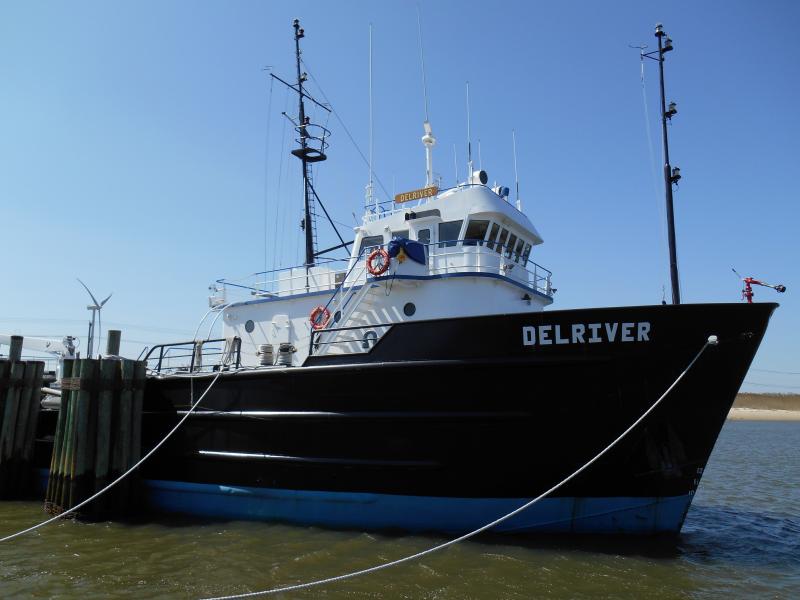When an oil spill was discovered in the Delaware Bay last week, Richard Gaudiosi and his team at Delaware Bay and River Cooperative were ready to help out.
DBRC, with operations in Lewes and Linwood, Pa., is funded by the petroleum industry to protect the environment. Its purpose is solely to respond to accidental oil spills in the river and bay by members. Gaudiosi, president of the DBRC, says membership includes nearly all shipping companies, refineries and terminals that operate in the Delaware River or Delaware Bay.
“We’re kind of like a fire house; we’re always ready to go,” he said. “We’re on standby for any event that might happen to our members or, for that matter, the port.”
The source of the oil spill that’s depositing tar balls and debris onto Delaware’s bay and ocean beaches is still unknown, but Gaudiosi said the Coast Guard and Delaware Department of Natural Resources and Environmental Control provided funding for DBRC to help with the response effort.
“They decided DBRC was needed and found a way to fund us,” he said.
This oil spill is a bit tricky, Gaudiosi said, because the source is unknown. Aerial flights over the bay were unable to find much oil in the water. DBRC was deployed to one area where debris was seen, and the crew collected two 55-gallon bags of oily debris and tar balls from the water. Since then, he said, there haven’t been any other sightings in the bay.
“We suspect the oil got just heavy enough that it sank and flights over the bay couldn’t see it,” he said. “They couldn’t direct assets to a specific area for recovery.”
DBRC has been on standby since, ready to help if an area is identified. Gaudiosi said it doesn’t make sense to continuously search from a boat, hoping to come across oil in the water.
DBRC continued to help in other aspects, Gaudiosi said. His crew surveyed the Lewes-Rehoboth Canal, the Broadkill River, Cape May-Lewes Ferry terminal and the Outer Wall for impacts from the spill. No evidence of oil in the canal was found, but some oiling was discovered on the breakwater.
“We wanted to give the Coast Guard and DNREC some idea of where oil was traveling,” he said. “We did water surveys several times for them.”
Gaudiosi is hopeful recent northeast winds have blown what oil is left in the water ashore, so crews on the beaches can clear it. If any oil is left in the water, he believes it will be brought into shore when the remnants of Hurricane Zeta come through the Cape Region.
DBRC receives no funding from the states in its territory. All funding comes through members, which are charged fees based on how many barrels of oil are transported over the water, whether from ship to ship, or ship to shore.
For that fee, DBRC will respond to any incident involving a member. It has more than 100,000 feet of boom – floating, physical barriers to stop oil from spreading – along with a series of skimmers and several small boats. Locally, it owns and operates the Del River, the 166-foot vessel that’s docked in the harbor at the University of Delaware College of Earth, Ocean and Environment at the end of Pilottown Road in Lewes.
In addition to response, DBRC also provides technical assistance and training to members that have their own emergency response teams.
“We do all the training with them and maintain their boats so when they turn the key they can do their job, and they know how to do that operation, whether skimming, anchoring or putting out a boom,” Gaudiosi said.
DBRC employs 14 full-time workers, including crew that’s ready to respond to an incident within an hour. Many vessels entering the Delaware Bay and River need to go through the process of lightering, where oil and other hazardous chemicals are removed from the ship in order to reduce its draft when entering the river. This is done because tankers typically come in with a draft of 55 feet and the river is dredged to only 40 feet.
When lightering occurs, DBRC has a single crew member on the vessel in Lewes to make sure the Del River is warmed up and ready to respond if there is a spill. The rest of the crew is on half-hour standby and is called in if a spill does occur.
COVID-19 has slowed down oil shipping, Gaudiosi said, but in a typical year, lightering would occur about every other day. It can occur any time of day, meaning DBRC is on call frequently.
“This is a commitment by members of the cooperative to provide protection for the environment in case something bad happens,” Gaudiosi said.
To learn more about DBRC, go to http://dbrcinc.org/.
Nick Roth is the news editor. He has been with the Cape Gazette since 2012, previously covering town beats in Milton and Lewes. In addition to serving on the editorial board and handling page layout, Nick is responsible for the weekly Delaware History in Photographs feature and enjoys writing stories about the Cape Region’s history. Prior to the Cape Gazette, Nick worked for the Delmarva Media Group, including the Delaware Wave, Delaware Coast Press and Salisbury Daily Times. He also contributed to The News Journal. Originally from Boyertown, Pa., Nick attended Shippensburg University in central Pennsylvania, graduating in 2007 with a bachelor’s degree in journalism. He’s won several MDDC awards during his career for both writing and photography. In his free time, he enjoys golfing, going to the beach with his family and cheering for Philadelphia sports teams.






















































